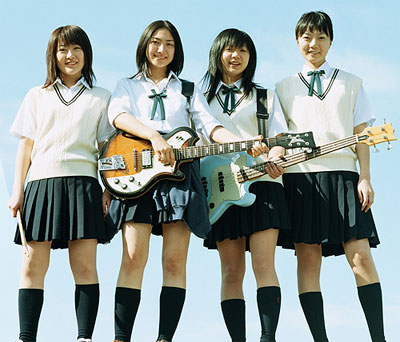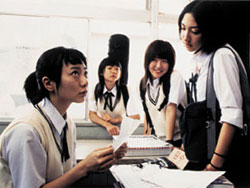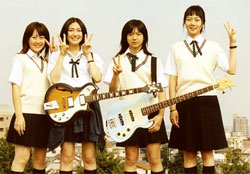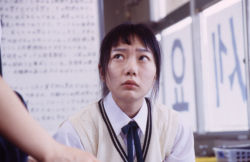Rock 'n' Roll High School: Asian American Film Festival (Part 3)
Linda, Linda, Linda (2005, Dir. Nobuhiro Yamashita)

When we grow up, we won't quit being kids.
We've only got a little time left to be us.
Nobody does high school quite like the Japanese. While Hollywood films about the Wonder Years are usually bathed in the glow of fond remembrance (see: John Hughes), they're also spiced with a bit of parody (Grosse Point Blank), outright satire (Election), or raunch (American Pie). But in Japan, everything and anything connected to teenagedom is elevated to almost mythic importance -- not surprising, given that it's the last time for many Japanese to express something resembling freedom, individuality, fear, hope. Films running the gamut from the operatic All About Lily Chou-Chou to wistful anime classics like Kimagure Orange Road and box office hits like Love Letter (which hinges on a crucial unrequited high-school romance) have glorified the fumbling interactions, inchoate longings, and life-or-death strivings for acceptance that characterize Japan's 14-to-18 set.
Which makes something like Linda, Linda, Linda even more of a surprise. It hits the same beats the above works do, but in its deadpan amusement, its detached affection, it carves out a new paradigm for the genre: call it pop-punk high school.
 |
The set-up couldn't be simpler: It is Festival Week at Shibazaki High School, the annual event in which the school grounds become a carnival, a celebration for outgoing seniors, and a final salute to teenagedom, all in one. A group of girls, including the glowering Kei (Yu Kashii), perky Keiko (Aki Maeda), and the stolid bassist (natch) Nozomi (Shiori Sekine) are throwing together a rock band for the festival's concluding variety show, but a spat between two of them leaves the band without a lead singer, with the show only three days away. Kei makes a wager that the band can draft and successfully train the first person they see to fill the role -- and that person happens to be oddball Korean exchange student Son (Bae Doo-Na), whose command of Japanese is, um, limited.
It's easy to see where this is heading: the band, which sounds endearingly ragged on first rehearsal, will pull together, triumph over adversity, and create a shining moment that the girls (and their brethren) will remember for the rest of their lives. Where Linda, Linda, Linda differentiates itself from the typical genre exercise is in its studious avoidance of the cliches. There are no unenlightened school administrators or bitchy competitors to disturb the course of our heroes, no tensions within the band that threaten to destroy chemistry, not even the blush of a major romantic subplot to satisfy the lovey-dovey audience members. In fact, there is nothing more at stake than throwing together a few songs by the punk rock legends The Blue Hearts, and performing them well. We receive a clue as to where this film will go with the opening narration (see top of this article), which is related in defiant tones by a girl looking straight at the camera -- and then the mood is punctured as a hyperactive student director argues with his DP, and suggests that the girl reads the lines again for his documentary. In one fell swoop, Yamashita is telling us: This high school stuff isn't that serious -- just have fun with it.
 |
 |
The film is also elevated by Bae, who is probably one of the most fascinating actresses working today (see Take Care of My Cat for a prime example of how she can take over a film without seemingly trying). With her big eyes and gawky figure, she resembles the little sister of Faye Wong (Chungking Express), but in her quizzical spaciness, the way she morphs from puzzled outsider to silly insider, she's like Faye with soul. In her stillness she is mesmerizing; when the infrequent smile bursts out on her face the effect is as liberating as the rainstorm that closes the movie. The last image (and the one that sticks with us) is a close-up on that smile, as the crowds cheer and the glorious power pop of "Linda, Linda, Linda" echoes off the makeshift student stage -- and then the band plays on with the fitting "Endless Song." It won't change world cinema, and it doesn't matter -- Linda, Linda, Linda is a trifle that validates The Blue Hearts, high school, and the necessity of modest pleasures.


0 Comments:
Post a Comment
<< Home